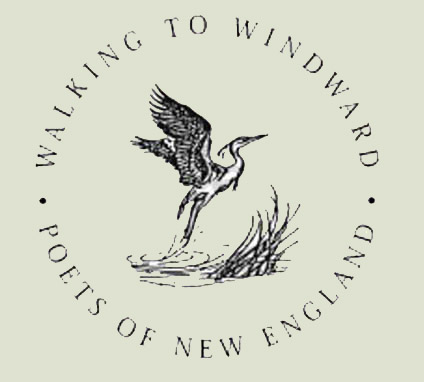

Go to Volume I Volume II Volume IV Next
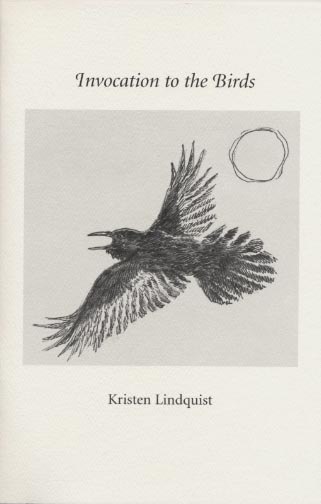
ISBN 1-882291-672-7 / 36 pp. Paper / Price: $8.00
"The
lyric precision of her poetry is quietly breathtaking. Form and rhythm
deftly evoke earth and sky and the human impulse to call attention,
celebrate, and confront." -- Baron Wormser
Kristen Lindquist is a Maine native currently
living and working in Rockland, Maine. She attended Middlebury
College and received an MFA from the University of Oregon. For
many summers she was on the administrative staff of the Bread
Loaf Writers Conference. She has taught various writing workshops,
as well as for the Johns Hopkins University's Center for Talented
Youth, and has been a board member of the Live Poets Society.
Her writing has been published in such venues as the Maine
Times, Potato Eyes, Feminist Times, Café Review, and
Down East Magazine. Noteworthy awards include the 1992
Bread Loaf Poetry Prize, the 2001 Red Fox Award, and second-place
for the Penobscot Watershed Poetry Award in 1998. She is indebted
to her wonderful poetry group of
Kate Barnes, Elizabeth Tibbetts
and Candice Stover, with whom she has been writing and doing readings for many years.
HAWK IN A TREE, ROADSIDE
Fields assume
their contours as long, furred bodies,
rise to meet the mist.
Already oak's bare branches skein across
the bright wash of this strange winter mist
like tangled hairs upon sheets.
Already these simple roadside epiphanies
of driving alone, fast, on a raw
December morning, having just left
the bed of a new lover,
this heightened attention to detail,
like an extra sense, somehow awakened
through the skin.
The hawk's chest bears dark arrows
of brown feathers on white.
It flies away slowly
over the blueberry barrens, unafraid,
losing itself in the simple reality of air.Copyright © 2001 by Kristen Lindquist
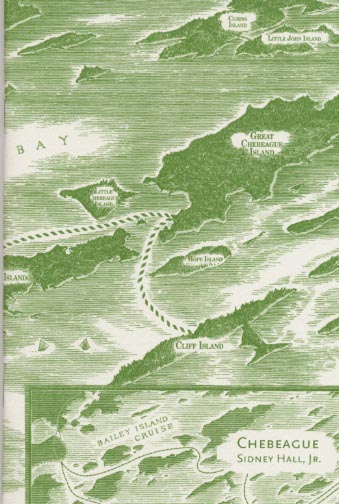
ISBN 1-882291-70-0 / 36 pp. Paper / Price: $8.00
A "poet's history" of an island off the Maine coast. . . . Call him a neo-classicist seasoned by the spirits of Zen and Taoism-his poems are revelations, beautiful and true. -- Sam Hamill on Hall's What We Will Give Each Other
Sidney Hall, Jr. has lived most of his
life in southern New Hampshire. He has a degree in Greek and Latin
Classics from Reed College. He has been a publisher, editor, columnist,
Latin teacher and active conservationist. His poems have appeared
in a number of literary journals and several anthologies. His
poems and book reviews have appeared in the Los Angeles Times.
He is the author of a book of poems, What We Will Give Each
Other and a book of memoirs, Small Town Tales.
CHARLIE
He has found a good way to retire,
caretaker to summer homes,
ferry boat days done
captain of small things now.
He comes out of his small house
and goes back in like any soft,
important animal. He may
have a wife in there but it is not clear.
He doesn't seem to be lonely.
He knows most everybody,
and most everything he needs to know.
Most everybody knows him. One old man
said under his breath, "There's some things
probly Charlie don't know."
This Chebeague island is home to Charlie.
His tracks are in the sand
weaving and going, and dodging and dallying,
and heading to higher and higher ground
because the tide is coming in.Copyright © 2001 by Sidney Hall, Jr.
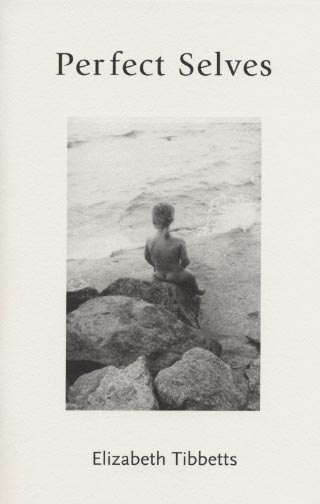
ISBN 1-882291-73-5 / 36 pp. Paper / Price: $8.00
"Her
poems are distinguished by their thoroughly intellectual candor. She
knows human deception and self-deception inside out. But it doesn't
faze her; it inspires her all the more to conjure the beautiful and
awful that comprise moments, days, and lives." -- Baron Wormser
Elizabeth Tibbetts' poems have appeared
in The Beloit Poetry Journal, Calyx, Green Mountains Review,
The Laurel Review, The Spoon River Poetry Review, and other
journals, and are forthcoming in Prairie Schooner. She
has received a Martin Dibner Creative Writing Fellowship, a St.
Botolph Club Foundation Grant for writing, a Ragdale Foundation
residency, a Blue Mountain residency, the Penobscot Watershed
Poetry Prize, and was a runner-up for The Puamanok Poetry Award.
Her poems were nominated for Pushcart, 2000 and 2001. She has
a degree in Nursing, and has worked as a nurse for the past twenty-three
years.
COMING HOMEOh, God, the full-faced moon is smiling at me
in his pink sky, and I'm alive, alive(!)
and driving home to you and our new refrigerator.
A skin of snow shines on the mountain beyond Burger King
and this garden of wires and poles and lighted signs.
Oh, I want to be new: I want to be the girl I saw
last night at the mike, sex leaking from her fingertips
as they travelled down to pick at her hem.
She was younger than I've ever been, with hair cropped,
teeth glistening, her shimmering body written
beneath her dress. She held every man in the audience
taut, and I thought of you. Now I'm coming home
dressed in my sensible coat and shoes, my purse
and a bundle of groceries beside me. When I arrive
we'll open the door of our Frigidaire
to its shining white interior, fill the butter's
little box, set eggs in their hollows, slip meats
and greens into separate drawers, and pause
in the newness of the refrigerator's light
while beside us, through the window,
the moon will lay a sheet on the kitchen floor.Copyright © 2001 by Elizabeth Tibbetts
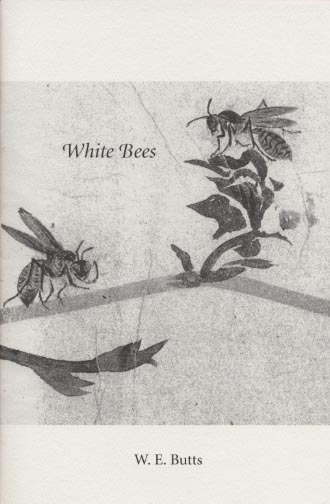
ISBN 1-882291-62-X / 48 pp. Paper / Price: $8.00
Portsmouth NH Poet Laureate 2009-2013.
"An uncle with a club foot, a Vietnam vet
leaning out the window, his father at the pool table. . . . Butts
returns to his signature theme-the past. . . . Memory does not console,
but rather haunts and unsettles in its enigmatic fragments. . . ." --
James Haug
W. E. Butts (1944-2013) is the author of The Inheritance
(Four Zoas Press, 1983), The Required Dance (Igneus Press,
1990), Movies in a Small Town (Mellen Press, 1997), and
A Season of Crows (Igneus Press, 2000). His poems have
appeared in such publications as Atlanta Review, Mid-American
Review, Poet Lore, and the 1997 Anthology of Magazine Verse
& Yearbook of American Poetry. The recipient of a Pushcart
Prize nomination, he received an MFA in Writing from Vermont College and
the Iowa Source Poetry book prize in 2006. He taught English and writing at the University of New Hampshire
and Hesser College.
1954: TWO PARADES
Just home from Korea, a decorated war hero was leaning
toward the crowd, from the hotel's third floor,
and we heard the drum roll, marching band,
rifle-fire in the humid air, Mother and I,
while Father worked the late shift.
Didn't I know what war was,
times in the weeds I waited for the enemy?
Little Bobby lost an eye in one of those battles,
shot out by his own brother's pellet gun.
I remember, all those childhood years after,
his glass-marble stare seemed wrong,
and his brother's self-hatred.
That was the summer the daughter of the kind woman
who owned the dining car my mother washed dishes in
became Miss New York State, in a parade of lace
and lilacs, their petals the pale lavender
of a heart on the breast of a graceless uniform,
or the satin that ten years later would line my father's casket.
We all stood cheering on the street
to wave along the beauty we were not.Copyright © 2001 by W.E. Butts
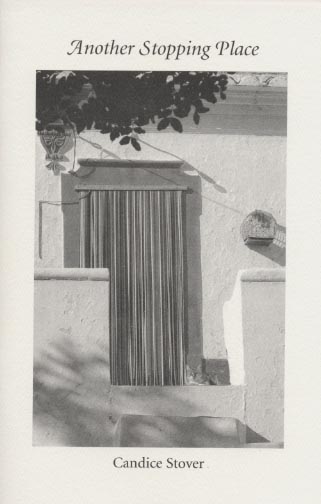
ISBN 1-882291-74-3 / 38 pp. Paper / Price: $8.00
"Stover
is a wonderfully spirited traveler who reaches beyond evocation to make
us feel the peculiar, exciting, at times menacing auras of other
places." -- B. Wormser
Candice Stover's collection of poems,
Holding Patterns, was selected by Mary Oliver as winner
of the 1994 Maine Chapbook Award. A native of Maine, she has worked
as a reporter for The Boston Globe and teaches extensively,
including two years in Shanghai, China and a recent trip to New
Zealand. Her writing has appeared in The Beloit Poetry Journal,
Seattle Arts, and Yankee Magazine, as well as other
journals, and she has twice received residencies at the Blue Mountain
Center in New York. She designs and facilitates workshops with
an emphasis on women's autobiography and poetry and lives on Mount
Desert Island. She has work forthcoming in Calyx, U.S.
1 Worksheets, and Hope Magazine.
MEETING AT AN EXHIBITION
Tsukigase Plum Valley
Okada Hanko, 1843
Oh, valley in a village forever flowering!
How long to paint this ten-foot-moment,
moment in a season we enter at the right,
passing tufts of bloom to strokes of field,
the tinted street familiar to a stranger
taking ease beneath his eaves?
How long to cross this bamboo bridge
and begin climbing steps dashed
over the mountain, reaching at last
the quick cool froth of the plum trees?
The scholar's retreat stands empty.
Leave it.
Leave it, as Hanko did, at the deckle edge
of nowhere, the characters of his name
brushed beside the nameless ones
already gathering branches bent
with Tsukigase's blossoms.Copyright © 2001 by Candice Stover
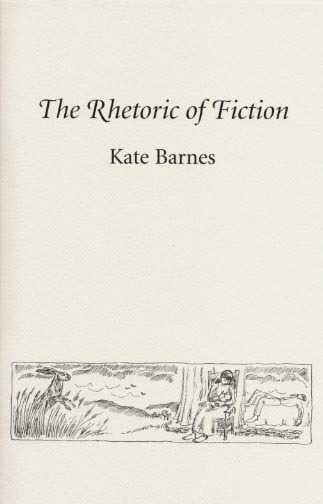
ISBN 1-882291-75-1/ 32 pp. Paper / Price: $8.00
No woman should be ashamed if, in her
writing, she tries to give back to the world a portion of its
lost heart. (Louise Bogan) A contemporary ballad as heart-rending
as Frankie and Johnnie--in a modern scenario.
Kate Barnes is the daughter of authors
Henry Beston and Elizabeth Coatsworth. Her book Where the Deer
Were, Godine 1994, has just come out in paperback. She lives
in Maine on a farm that raises hay and blueberries, and where
she rides an ancient steed, who is a saint. Her poetry appeared in the New Yorker, Harpers, Kenyon Review, American
Scholar and elsewhere.
CHAPTER FIVE: THE NIGHT WIND
Darkness is coming at last, and the yellow evening star
hangs brightening in the west like a glow-worm in a jar.
The children's high voices shriek, their bare feet rush, they play
fiercely; they stretch the cool hour caught between night and day.
The horses stamp at their manger, the hens fly up to the trees.
Now there is wind in the garden and no more droning of bees,
and the night wind says, "Mount and go. See the notch of
the pass? You must cross and ride away through a thousand
miles of blowing grass."
Copyright © 2001 by Kate Barnes